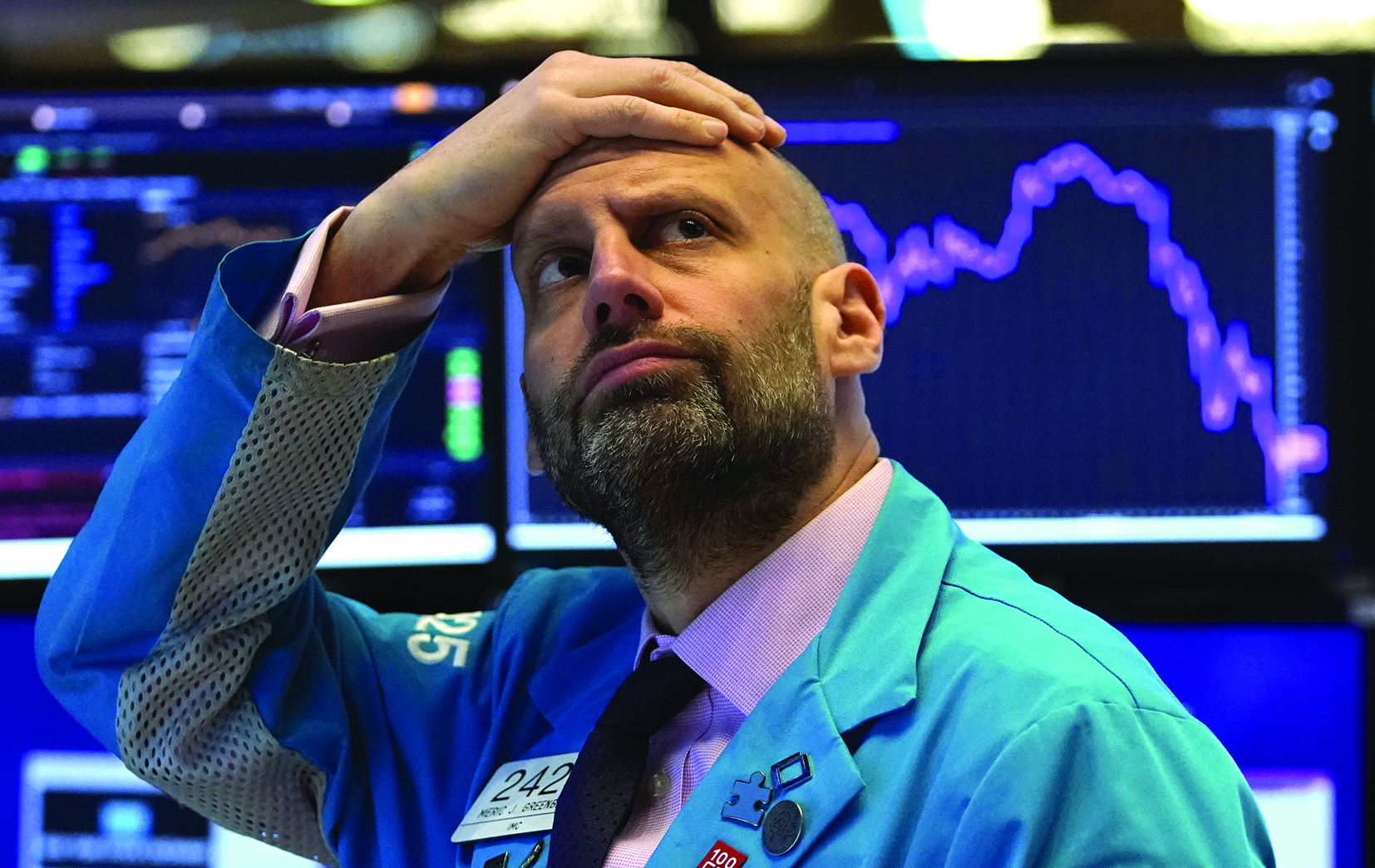
LONDON: Global stock and oil markets plunged yesterday as vast stimulus measures failed to offset heightened concerns that the worsening coronavirus outbreak will tip the world into a deep downturn, dealers said. In European trading, Frankfurt, London and Paris tanked around five percent in afternoon deals, after similar dizzying losses across Asia.
Wall Street stocks resumed their downward slide early yesterday as the economic toll mounts from the rapid near-shutdown of key industrial and services sectors. About 15 minutes into trading, the Dow Jones Industrial Average stood at 20,040.66, down around 1,200 points or 5.6 percent. The broad-based S&P 500 slumped 5.4 percent to 2,392.27, while the tech-rich Nasdaq Composite Index tumbled 4.6 percent to 6,997.10.
Before the market open in Paris, French regulators banned for one month short-selling, or the betting that markets will fall-extending an initial one-day halt, in an effort to curb steep losses. World oil prices spiralled lower on energy demand woes, with New York's WTI crude plunging 12 percent to an 18-year low and Brent tumbling 6 percent.
Yet most market commentators agree that the virus-wracked world economy will likely plunge into recession-which means a minimum of two successive quarters of economic contraction. "From what we see from the markets' reaction, massive monetary and fiscal measures deployed are not thought to be enough to prevent economies from plunging into recession," Swissquote Bank analyst Ipek Ozkardeskaya said.
"Every business and household is expecting governments to replace the coronavirus-led losses, which is simply not possible. "Hence, there is already a massive shock in activity and demand, which almost guarantees a worldwide recession regardless of the measures taken by central banks and governments," Ozkardeskaya added.
Governments and central banks are injecting eye-popping sums and emergency policy remedies into the global economy as the coronavirus pandemic upends all normal life. Markets have crashed as world growth faces its biggest crisis since 2008, and have so far resisted the efforts to restore calm as the outbreak engulfs the West.
AFP surveys responses by major economies as the coronavirus has spread from China to infect the rest of the world, enforcing national lockdowns and crippling businesses:
North America
On Tuesday, US Treasury Secretary Steven Mnuchin said officials were drawing up a package that could surpass $1 trillion, on top of $300 billion in deferred tax payments. The measures-far surpassing aid during the 2008 financial crisis meltdown-are likely to include direct cash payments to struggling families. The package is in addition to $100 billion directed at paid sick leave and expanded unemployment benefits already moving through Congress.
A bailout for US airlines could also be in the works, after Mnuchin said they face a crisis now "worse than 9/11". In Canada, authorities are rolling out a Can$10 billion (US$7.5 billion) credit package to help struggling businesses and have also cut interest rates. The International Monetary Fund is making $50 billion available for poorer countries and has also appealed for a "global response".
G7 leaders including Trump on Monday vowed to coordinate and "do whatever it takes, using all policy tools" to safeguard growth, but offered no specific action plans. Dusting off their playbook from 2008, the Fed, European Central Bank (ECB), Bank of Japan and others on Sunday announced measures to try to keep dollars pumping through the global economy.
Europe
After China, Europe is now the epicenter of the COVID-19 coronavirus outbreak and governments have scrambled to open the spending taps while at the same time closing their borders. British finance minister Rishi Sunak on Tuesday unveiled an "unprecedented package" of government-backed loans worth £330 billion ($400 billion). President Emmanuel Macron of France, which is now on total lockdown, said Monday the government would ensure that all bank loans to companies are backed by a state guarantee totalling 300 billion euros.
The French government announced a separate aid package worth 45 billion euros to help businesses and employees cope. Germany has unveiled 550 billion euros in government-backed loans "for starters", and suspended legal obligations for firms facing acute liquidity problems to file for bankruptcy. In hardest-hit Italy, the government promised to deliver a "very strong injection of liquidity" into the financial system to generate 340 billion euros ($380 billion) in cash flows.
Spain plans to guarantee up to 100 billion euros in corporate loans. For the European Union as a whole, finance ministers pledged Monday to fight the coronavirus "war" but declined for now to tap up the European Stability Mechanism, the eurozone's 410 billion euros war chest. The ECB is reviving crisis-era measures to encourage bank lending to beleaguered companies, but surprised the markets by keeping its borrowing rates on hold last Thursday.
Asia-Pacific
China, ground zero of the virus outbreak with more than 3,000 deaths, has cut interest rates and vowed a range of measures including tax cuts and more fiscal transfers from Beijing to virus-hit regions. New Zealand Tuesday raided its "rainy day" fund to release NZ$12.1 billion (US$7.3 billion) in stimulus spending.
Last week, Australia unveiled a US$11 billion spending plan-equivalent to just under one percent of GDP-to help avert its first recession in 29 years. Japan, which faces a huge financial hit from the possible postponement of the Tokyo Olympic Games this summer, is offering at least $15 billion in loan programs for firms.
The Bank of Japan, bringing forward its latest policy meeting to Monday, said it would double its annual capacity to buy exchange-traded funds and property investment funds. Hong Kong's government is giving a cash handout to every permanent resident, with a recession brought on by months of political protests now exacerbated by the coronavirus. - AFP









